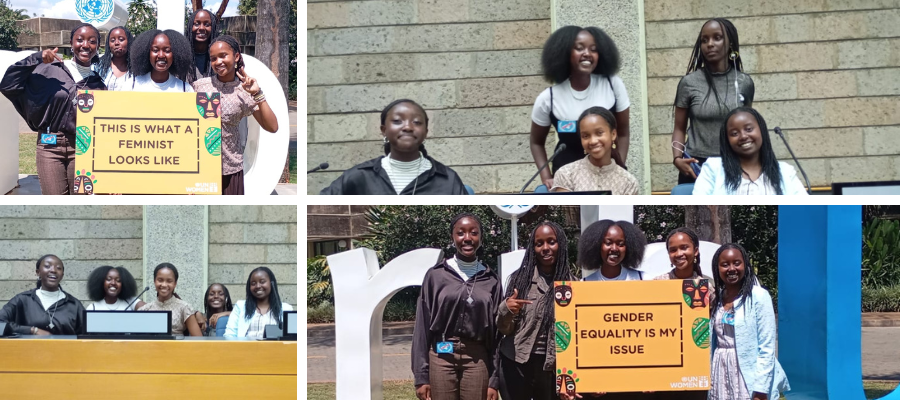
My name is Keendi, a student at Loreto, and a proud girl-child. I am thankful to UN Women as well as my school for giving me the opportunity to engage in the celebration of the Girl child at the UN Headquarters in Nairobi.
So much insight was shared and so many lasting connections were made as we discussed the pivotal issues affecting girls on a global stage. We discussed socio-economic barriers, political barriers, stereotypical beliefs and societal norms built on tradition, as well as gender-based harassment and discrimination.
It is very saddening to note that girls are demeaned by their own families and restricted from having certain opportunities like quality education, simply because the parents do not think they are responsible enough. There are forms of social, economic and political discrimination that put girls in very vulnerable positions. Educational and vocational opportunities are scarcely available to them as compared to their male counterparts, and in political spaces women are looked down upon and speculations are made on whether or not they are capable of doing the job, and doing it well.
Sexual, physical and verbal forms of abuse and harassment, both online and offline affect the mental health of girls and women, making them feel unsafe. To think that these actions are going on in supposed safe havens like school, community centers and even in homes, is the very unfortunate reality of our world, and we should all be ashamed of ourselves for letting it happen. When it comes to reproductive and sexual security, girls are taken advantage of, exploited, or denied permission to make their own choices about what to do with their bodies. Female Genital Mutations is still practiced in many communities, affecting the physical and mental health of the girls and their futures and esteem as they lose control of their bodies at a young age, and start to feel uncomfortable in their own skin.
Societal Norms and stereotypes pit our society against women and girls. They often stem from outdated gender roles, social expectations and traditional beliefs about femininity, such as:
1. Girls are overly emotional/sensitive and emotionally fragile
2. Girls are not as good at math or science
3. Girls are naturally nurturing and maternal
4. Gils are passive or submissive
5. Girls aren’t good leaders… E.T.C
Altogether these stereotypes deeply affect the girl child, diminishing their esteems. They may develop an internalized inferiority complex and feel as though they will not be good enough in certain fields or areas of work. It would also diminish their confidence and this could make them underestimate the value they have and the power they carry in the palm of their hands. Their opportunities for growth and networking are limited.
The ratio of men to women working in STEM shows a surprising gender gap. Girls are told from a young age that they are not going to be able to work in such fields and even during their education, are scrutinized when they want to study anything within the scope of Sciences and Mathematics, because people have a perception that those are the ‘male jobs’ and career spaces, and that girls should be learning how to become good mothers, engaging in care-giving work spaces. As well as the effect on their mental health, physical and social development.
In schools today, we see less girls’ participation in sports. This is prompted by the idea that girls are weaker than or less athletic than boys, which would deprive them the physical and emotional benefits of teamwork, exercise and competition.
Stereotypes can lead to girls being judged harshly by their peers, especially if they don’t conform to societal expectations. Girls who defy traditional gender roles or stereotypes, such as not being “feminine” enough or avoiding social drama, may face bullying or exclusion. This can harm their social development and sense of belonging. Additionally, negative stereotypes about girls being manipulative can breed distrust in friendships and relationships, resulting in toxic social dynamics and feelings of isolation.
Over time, girls may internalize these harmful beliefs, leading to a negative self-perception where they believe they are inherently inferior in areas like leadership or intelligence. This internalized misogyny can limit their ambitions and reinforce gender stereotypes for future generations. In education, these stereotypes can manifest as biases from teachers or a lack of encouragement in subjects like STEM or leadership roles, further lowering girls’ confidence and ambition, ultimately impacting their academic performance and career aspirations.
As we celebrate The international Day of the Girl Child it is essential to recognize the pressing issues girls face and to take action. Girls deserve the right to live without the burden of stereotypes, discrimination, and abuse. They deserve equal opportunities in education, the freedom to make decisions about their bodies, and the ability to lead with confidence. It is our collective responsibility to challenge these societal norms and advocate for a world where girls are empowered to achieve their full potential.
I, Keendi, a proud student of Loreto, call upon everyone—governments, educators, communities, and individuals—to join forces in creating an inclusive society that uplifts girls and offers them the opportunities they deserve. By doing so, we can build a brighter, more equitable future for all. Let The International Day of the Girl Child be a powerful reminder that every girl is capable of greatness and worthy of respect, support, and opportunity. The time to act is now.
Author: Keendi M, Loreto Convent School Kenya (MSMUN)
Photos: Loreto MSMUN Students attending the IDG2024 at UN Nairobi
